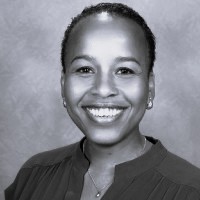
INTERVIEW - ANGELO MUSA, PÂTISSERIE CONSULTANT: "PÂTISSERIE IS LIMITLESS"
Recently awarded the ‘Best Pâtisserie Opening Award of 2024’ by La Liste 1000, the Chef is the creative and gourmand mind of two of the Dorchester Collection's establishments. |
 |
INTERVIEW - ANGELO MUSA, PÂTISSERIE CONSULTANT: "PÂTISSERIE IS LIMITLESS"
Recently awarded the ‘Best Pâtisserie Opening Award of 2024’ by La Liste 1000, the Chef is the creative and gourmand mind of two of the Dorchester Collection's establishments. |
Category: Worldwide - Interviews and portraits
- Gourmet restaurants
- Gourmet restaurants - Interviews - Industry leaders
Interview made by Sonia Taourghi on 2024-07-19
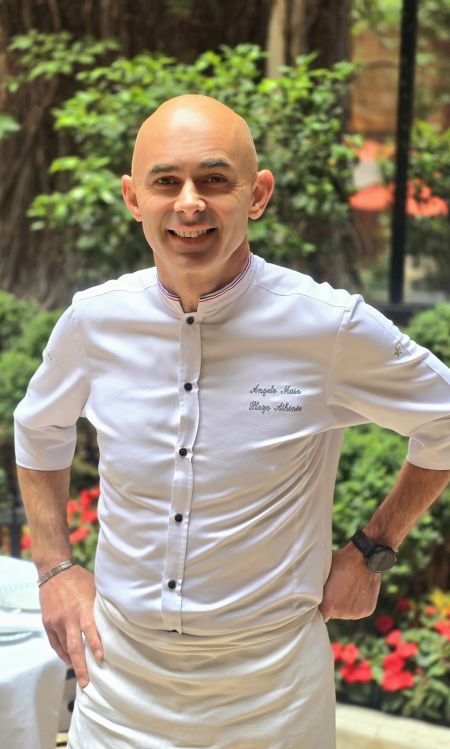 Angelo Musa, Chef Pâtissier, in the Cour Jardin at the Plaza Athénée, Paris
Photo credit © Sonia Taourghi / Journal des Palaces
Bonbon Café, The Lana's ‘so French’ tea room, allowed the chef to really discover Dubai, its cosmopolitan population and its dynamism. Today, his life and career are in stark contrast to what his training suggested. "When I started, there was no communication. I didn't even know you could learn pastry-making. I went to hotel school to learn cooking. After that, it was thanks to an incredible encounter with Mr Claude Bourguignon that I turned 200% towards pastry-making. This man changed the course of my life."
And what a path it has been ever since. From competition to competition, the pastry chef has grown in power and confidence and has made a name for himself. "First, you say to yourself, ‘Wow, I've done all that’. And then you see opportunities opening up. Around the time of the World Cup, I started getting a lot of requests and travelling around the world, especially in Asia. Then, the biggest springboard was the Meilleur Ouvrier de France Award in 2007. From there, I went on to set up my own consultancy company in 2008."
At the time, the pastry chef-turned-entrepreneur had no idea that a decade later, in 2020, he would be crowned Chevalier de l'Ordre des Arts et des Lettres. Today, Angelo Musa has also launched his eponymous jams. In a gentle voice, he talks about all the encounters that have marked his career, his little-known profession, and what he is learning from the younger generation.
Journal des Palaces: For those unfamiliar with the profession, what is a pastry consultant?
In fact, it's very broad. On the one hand, it can be advising companies that export their products abroad, such as Marrons Imbert, Chocolaterie de l'Opéra, fruit purées, etc. And they send you abroad to export your products. And they send you abroad to make a few recipes with their products, and give demos.
On the other hand, it's corporate consultancy, where we adapt to the company to create new products, guiding the teams, improving what can be improved: organisation, hygiene, logistics, and everything else that goes to make a kitchen run smoothly.
I once arrived at a bakery. And after 10 minutes, I said, ‘We're not going to make a cake, we're going to clean the lab first’. For two days, we cleaned everything up, tidied it all up and put it in place. I love telling this anecdote because it felt unbelievable at the time. But at the same time, I took just as much pleasure in tidying everything up, and I left satisfied with my work. When I returned to the company, we started making cakes.
That's also our duty as advisors.
How did you end up at the Plaza Athénée?
The Plaza was a great place to meet. I'd come to see the chef, Nicolas Berger, at his chocolate factory without knowing that I was going to meet Mr Ducasse. We chatted for fifteen minutes, and I left for Japan for a six-week trip.
Just as I arrived at the hotel, he called me to have a chat. I was 10,000 kilometres away, so it was a bit special... Except that he was also travelling to Japan! We saw each other again, and he made me some offers that I didn't accept because I was going through a difficult personal phase that prevented me from thinking ahead, but we kept in touch.
The following autumn, he made me a new offer, which I eventually accepted.
Alexandre Dufeu was the head pastry chef at the time, and he welcomed me like a prince. I arrived confident, without putting any pressure on myself, saying to myself, we'll see. That was in 2016. Since then, Elisabeth Hot has taken over the reins of the hotel and is doing an incredible job, which makes things a lot easier.
How did the Lana adventure and the Bonbon Café concept begin?
It was Mr Delahaye who told me about the project that Mr Pourry, the coordinator for the Dorchester Collection at the time, wanted to present to me. We met in London at Harrods. It was almost surreal. It was an incredible and exceptional opportunity to experience the project from its conception through to the opening, the beginnings, and now on a day-to-day basis. The Dorchester team had the idea of a traditional French pâtisserie and chose the name.
The world we've managed to create together goes beyond anything I could have imagined. It's not always easy to project yourself from an idea, from a space... And once everything is finalised... It's superb. The team is great and super motivated, and the feedback on the products is very positive. It's a wonderful adventure.
The idea for Bonbon Café was to make my own pastries, but now I also listen to the chef, Ankit Bhardwaj. He's a very interesting chef who knows the culture of Dubai, has travelled a lot, and has taken part in competitions. He was the right man for the job. These days, I go to Dubai every two months or so. Around Ankit, we have very talented sous-chefs and a very talented team, so I feel confident.
What does it mean to work with a group like Dorchester?
We stay in the lap of luxury whatever the establishment. It's fun to find yourself in Paris one time and then a few weeks later in Dubai; the two hotels are just as luxurious, and the people are just as welcoming, so that friendliness characterises the group.
When I came back for the opening of the Lana, for example, I was completely blown away. Café Bonbon didn't open until a month later, but I still had an extraordinary welcome, in a Rolls-Royce, and the whole pastry team and some of the other teams were waiting for me outside. I was moved, I really wasn't expecting that.
When Bonbon opened, I wanted to cry all over again. This time it was because I'd seen all the teams and workers working every day, and when I came back it was all over. They didn't do things by halves, it was so moving.
I was also lucky enough to visit the group's other hotels, and you can feel the same inspiration, quality and attention to detail.
Where does your inspiration come from?
Pâtisserie is infinite. Every time, even for me, it's as pleasant and surprising as anything you can imagine... At first, you think, who will I do this for? Who is the customer? Who's the target audience? And then the season is critical. In the beginning, it's hard to find inspiration: you try things out, and then other things come along and help you move forward with the project. It germinates, it's abstract, it's complicated. And then there's a moment when it just clicks, and from there it all goes.
At the moment, I'm working again on the log for the Plaza Athénée. I did a few tests last week, but I didn't like it, so I've almost gone back to something else, keeping a few taste inspirations. It's fun, it's a playground. This notion of playing and having fun is essential.
When I arrived at the Plaza, I discovered another universe. I worked on all the products with the team: the chef, the sous-chefs and a few young people. Young people who have given me some incredible ideas. It motivates them, it gets them out of their routine, and it's important to listen to them and showcase their creativity. With five brains, you can go further and faster! You have to keep listening if you don't want to miss the point.
Is that how Angelo Musa jams came about, through inspiration?
When I like something, I go further, I push things, and I get passionate about it.
It started when I got to take part in a course run by Jean-Paul Gaucher, whom I knew well and who is a god of jams. Suddenly, I fell in love with the product! So I bought everything from home: the pan, and the tripod, and then I started making jam, in small jars, and giving them away. After a year, I'd given away 700 of them!
Then COVID came along. That allowed me to work on the project in more detail, to clean up the recipe and "desugar" it. When I had the idea of marketing it, I had the opportunity to do so via a dedicated website angelomusa.com, and I also realised how lucky I was to have a group behind me. I'd started making a few jars for the Plaza, and when the Lana project came along, we added the jams for sale at Bonbon Café.
What advice would you give to someone starting in their career or looking to develop it further?
If I had to start all over again, I wouldn't change a thing. For my part, what helped me was to believe and be patient.
It's a very complex and rich profession that requires a lot of practice. And to acquire that practice, you need time. It doesn't just happen. So you need patience, perseverance, time, interest and inspiration.
It doesn't come from looking at Instagram, even if that helps. It's good to have goals and go after your dreams, but keep your feet on the ground, because it takes many years to acquire all this technique and know-how.
On one of my first trips to Japan, I was told that it takes about ten years to become a sushi master. In pastry-making, it's a bit like that. And even after ten years, there's still a long way to go! So I've been doing this for 35 years now, and I learn something new every day from the young people I meet; they're motivated and passionate. That's what keeps me going.
Finally, what are your three favourite desserts?
People often ask me that question! I'm a great gourmand and I love eating and eating well. As long as it's well done, I'm happy.
Near my home, I have a baker-pâtissier who makes all the classics, and his vanilla éclairs alone are a delight! It's incredible.
But to answer the question, I'd say, firstly, the mille-feuille.
When I started my apprenticeship, I always ate the scraps of the mille-feuille. When the mille-feuille is fresh, the puff pastry is caramelised, and crispy, with a soft vanilla cream. It's pure delight.
Then there are the seasonal desserts. I love strawberries. The strawberry shortcake is incredible. The strawberry tart.
I've been lucky enough to travel a lot, and I've learnt a lot of Japanese techniques, including one that I reworked to make a roll cake. I've made this biscuit my own and combined it with French products. It's a very soft, airy biscuit, with a texture combined with flavours inside. It's a very satisfying pleasure.
But there are so many of them. I have to add chocolate. I love chocolate. We make a 100% chocolate cake with four textures: a crisp, a biscuit, a ganache and a mousse. The four textures together are divine.
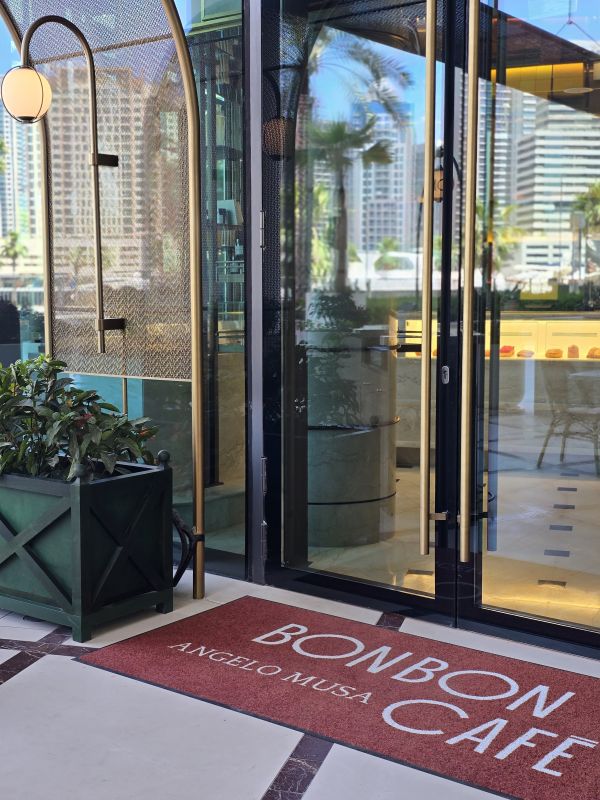 The entrance of Bonbon Café at The Lana, Dubai
Photo credit © Sonia Taourghi / Journal des Palaces
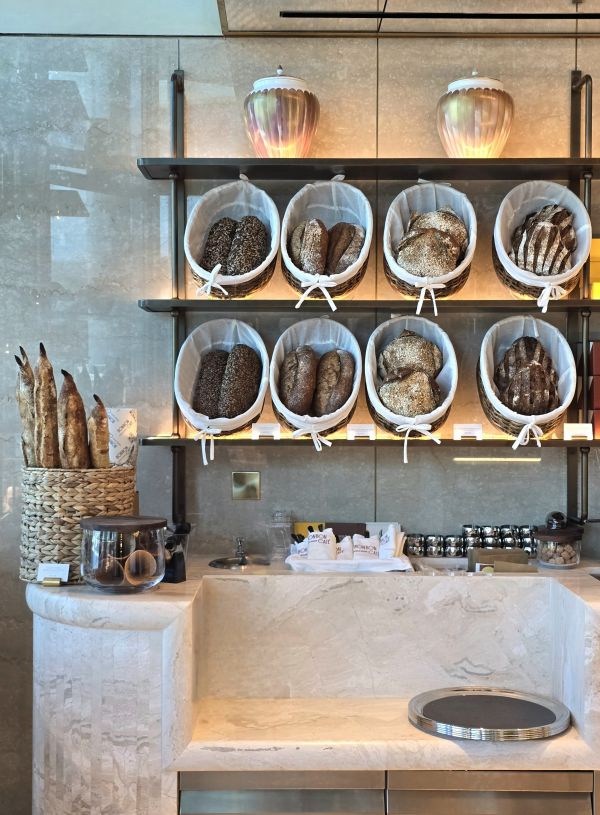 The bakery of Bonbon Café at The Lana, Dubai
Photo credit © Sonia Taourghi / Journal des Palaces
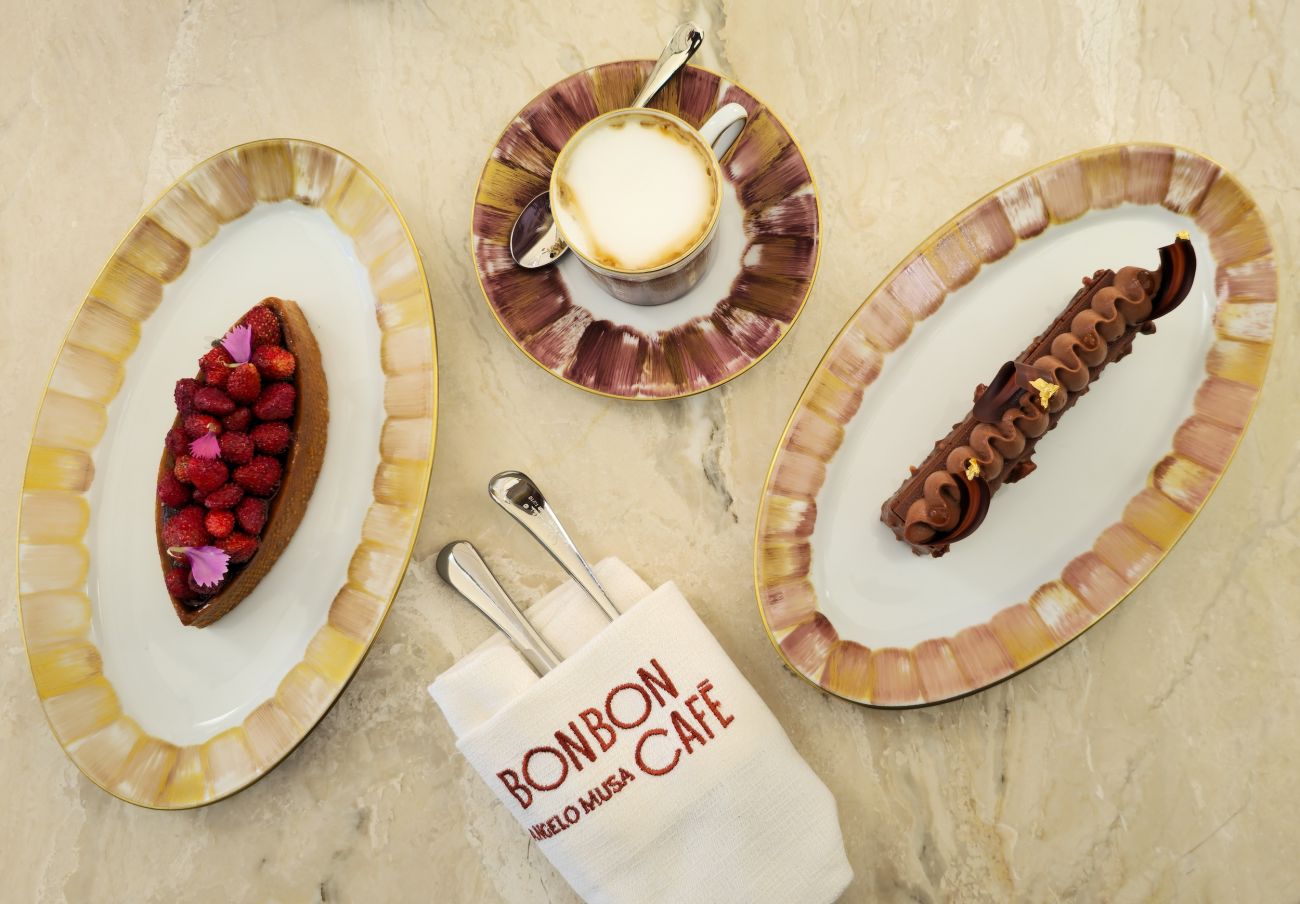 Selection of sweet treats at Bonbon Café at the Lana, Dubai
Photo credit © Sonia Taourghi / Journal des Palaces
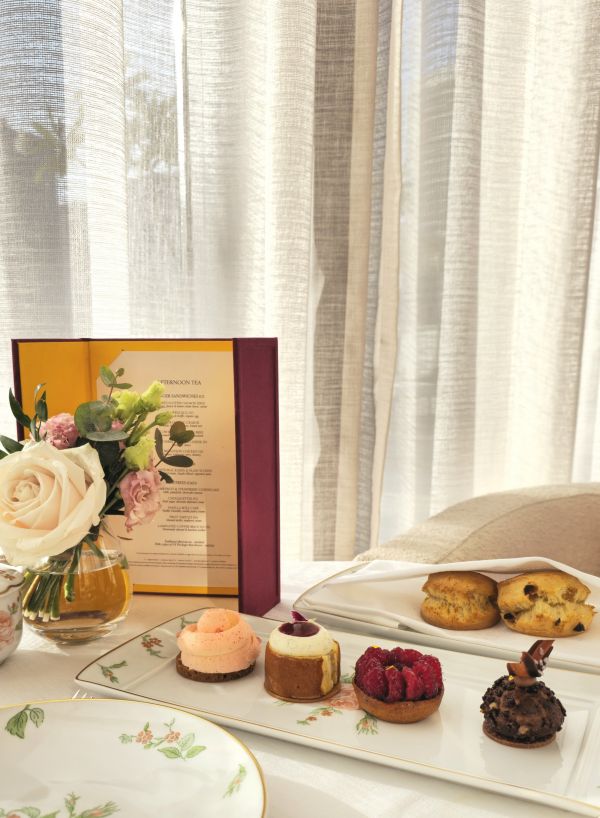 Afternoon Tea at The Gallery at The Lana, Dubai
Photo credit © Sonia Taourghi / Journal des Palaces
|
|





